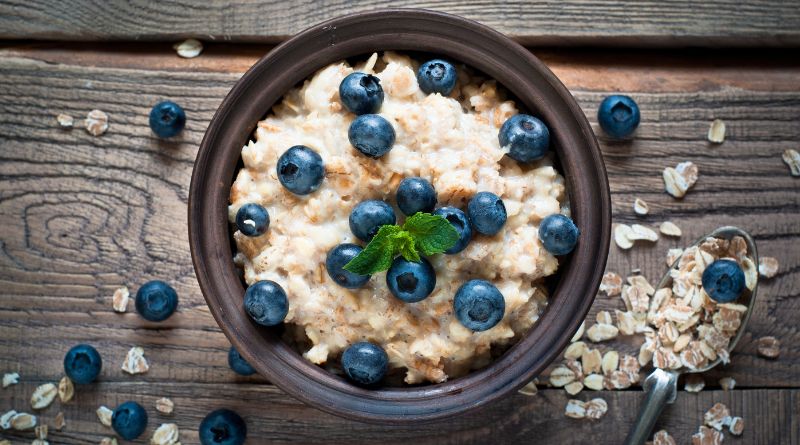Oatmeal is often considered a wholesome and nutritious breakfast choice, packed with fiber and various health benefits. However, like anything in life, moderation is key, and consuming too much of even the healthiest foods can have adverse effects. In this blog post, we’ll explore five potential side effects of eating too much oatmeal. While it’s a fantastic addition to your diet, understanding its limits is essential for maintaining overall well-being.
Oatmeal is a renowned and scientifically proven nutritious breakfast choice that is associated with improved health and potentially even longer life. However, like many good things, there can be too much of it. While oatmeal offers numerous health benefits, consuming excessive quantities in a single sitting can result in adverse effects on the body. To delve into the potential consequences of overindulging in oatmeal, we’ve sought the expertise of doctors and dietitians.
Their insights will help shed light on the potential drawbacks of excessive oatmeal consumption and provide valuable guidance on how to enjoy this wholesome food while maintaining a balanced and health-conscious diet.
1. Consuming a lot more sugar than you realize

Many individuals opt to sweeten their oatmeal to enhance its flavor and make it more palatable. Common additions include sugar, chocolate chips, and other sweet ingredients. While this can undoubtedly make oatmeal tastier, it’s essential to recognize that these enhancements come at a cost. The extra sugar, calories, fat, and carbohydrates introduced by these sweeteners can significantly diminish the overall nutritional value of oatmeal. Therefore, it’s advisable to explore healthier alternatives, such as fresh fruits, nuts, or a touch of honey, to maintain the balance between flavor and nutrition in your oatmeal.
2. Restricting the variety of nutrient

Making oatmeal a daily breakfast choice certainly offers energy and nutrition. However, it’s important to note that this routine can limit the variety of healthy foods you can savor in the morning. By sticking solely to oatmeal, you may miss out on the opportunity to diversify your morning meals and cater to a broader range of nutrients. Breakfast can be an exciting part of your day, and exploring different options allows you to nourish your body with a spectrum of vitamins, minerals, and flavors. So, while oatmeal is an excellent choice, it’s worth occasionally branching out to discover other delicious and nutritious foods that can provide similar benefits and make your breakfast more enjoyable.
3. Can cause malnutrition and loss of muscle mass
Oatmeal is often praised for its role in weight loss as it effectively curbs hunger, promoting a sense of fullness. However, it’s crucial to find a balance in its consumption. Eating excessive amounts of oatmeal may lead to unintended consequences. The prolonged feeling of fullness can interfere with your body’s natural hunger signals, making it challenging to meet your daily nutritional needs. Over-reliance on oatmeal as a primary food source can potentially result in malnutrition and muscle loss. Furthermore, the impact isn’t limited to the physical realm; cognitive functions may suffer, leading to reduced alertness and sharpness.
Thus, while oatmeal can be a valuable addition to a balanced diet, moderation is key to avoiding potential drawbacks to your overall well-being.
Quick Link: 15 Nutrient-Rich Foods That Can Help Transform Hair Loss into Hair Growth
4. Can make you feel bloated

Oatmeal is a fiber-rich food, which is excellent for digestive health. However, for some individuals, especially those not accustomed to its regular consumption, it can lead to bloating during digestion. To minimize this discomfort, nutrition experts suggest beginning with a small portion if you’re new to oats. Starting with a modest serving can help your body adapt and reduce the likelihood of experiencing bloating. Gradually increasing your oatmeal intake over time is also recommended. Consuming larger portions at once, due to its higher fiber content, can indeed result in more pronounced bloating.
Thus, it’s essential to be mindful of your body’s response to oatmeal and make adjustments to your portion sizes to enjoy its digestive benefits without discomfort.
5. Can cause you to gain weight

Eating a substantial portion of oatmeal, if not managed correctly, can indeed lead to weight gain. However, it’s not just the quantity of oatmeal that matters; it’s also crucial to pay attention to the toppings you add. Adding a tablespoon or two of nutrient-dense toppings like crushed walnuts or flaxseeds can enhance the nutritional value of your oatmeal. These additions provide healthy fats, fiber, and essential nutrients. On the flip side, excessive amounts of toppings like butter or sugar should be avoided, as they introduce extra calories and potentially unhealthy ingredients that can contribute to weight gain.
Therefore, maintaining a balance in portion sizes and being mindful of the types of toppings you use can help you enjoy the benefits of oatmeal without compromising your weight management goals.
Bottom Line
Oatmeal can undoubtedly be a nutritious part of your diet, but it’s crucial to be mindful of portion sizes and potential side effects. By enjoying oatmeal in moderation and balancing it with other foods, you can harness its health benefits without experiencing negative consequences. Always remember that a varied and balanced diet is the key to optimal health.
Frequently Asked Questions (FAQs)
Oatmeal is generally healthy, but eating it excessively can lead to certain side effects, which we’ll discuss in this blog post.
Eating excessive oatmeal can lead to weight gain, digestive issues, an increase in calorie intake, and potential nutrient imbalances. We’ll delve into these in detail in this post.
The amount of oatmeal that can lead to side effects varies from person to person, but generally, consuming large quantities regularly may be a concern. We’ll discuss this in our post.
Yes, there are ways to incorporate oatmeal into your diet without overdoing it. We’ll provide tips on portion control and balanced meal planning in the post.






